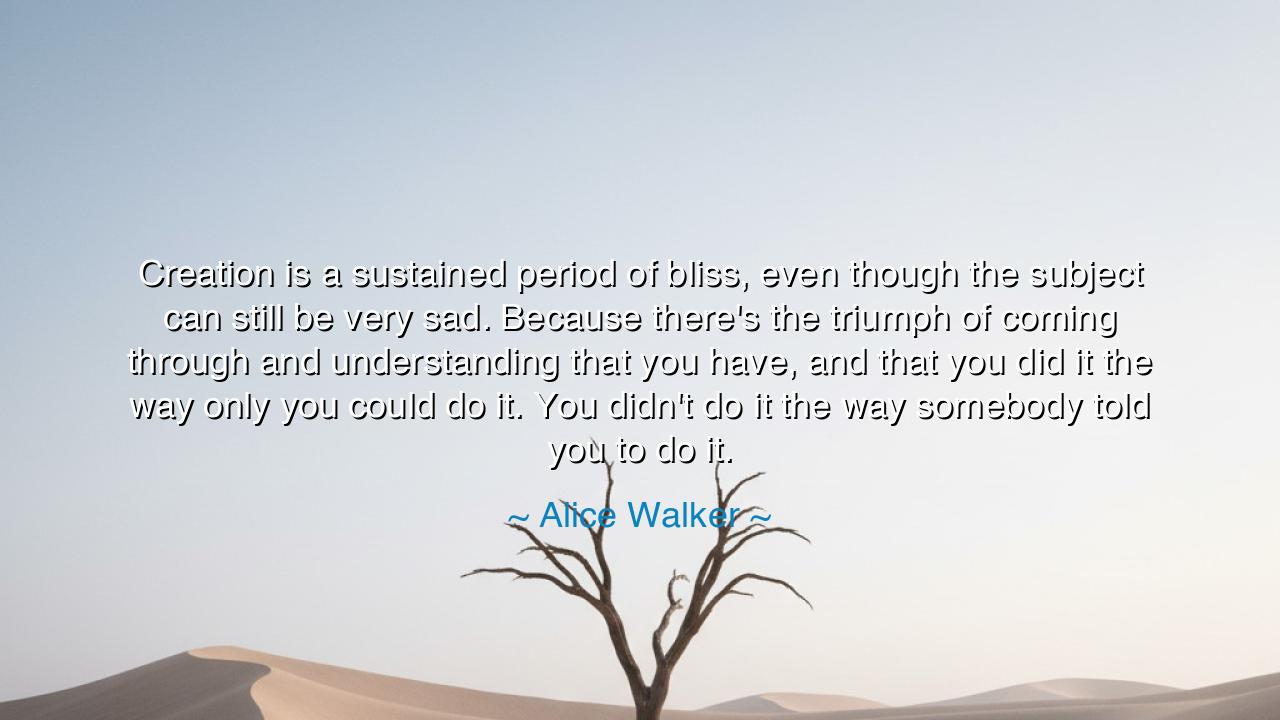
Creation is a sustained period of bliss, even though the subject
Creation is a sustained period of bliss, even though the subject can still be very sad. Because there's the triumph of coming through and understanding that you have, and that you did it the way only you could do it. You didn't do it the way somebody told you to do it.






There are moments in life when labor becomes joy, when struggle transforms into bliss, and when the act of creation itself becomes the highest form of expression. Alice Walker, the esteemed writer and thinker, captures this transcendence when she says, “Creation is a sustained period of bliss, even though the subject can still be very sad. Because there's the triumph of coming through and understanding that you have, and that you did it the way only you could do it. You didn't do it the way somebody told you to do it.” In these words lies the profound truth that the act of making—whether of art, words, or thought—is both a personal victory and a celebration of individuality.
Creation, as Walker describes, does not erase the sorrow of the subject; instead, it transforms it. Pain, grief, and melancholy are not obstacles but materials, raw and potent, waiting to be shaped by vision and effort. This mirrors the teachings of the ancients: the Greek concept of catharsis in tragedy, or the Buddhist notion of transforming suffering into wisdom. The artist, like the philosopher, channels emotion into form, discovering not only the external expression but the internal mastery of self. Even in sadness, there is triumph, for the act of creation confirms the endurance and resilience of the human spirit.
Walker emphasizes the unique voice of the creator. True creation is never mere imitation; it is the authentic manifestation of the self. In her words, the artist does not follow another’s path, but finds a route that exists only in their own experience and insight. This principle echoes the philosophy of Aristotle, who argued that virtue is found in the development of one’s own rational capacities, and that excellence arises from realizing one’s own potential rather than copying another. To create authentically is to honor one’s inner truth.
History offers countless examples of this triumph. Consider Vincent van Gogh, whose paintings were born from suffering, isolation, and despair. The subjects of his art—sunflowers, starry nights, and humble people—were not always joyful, yet in the act of painting, van Gogh experienced a profound sense of fulfillment and identity. His work, entirely his own, demonstrates Walker’s insight: creation brings bliss not because the subject is light, but because the artist has traversed the struggle and made it visible in a way that only they could.
There is also a lesson in the resistance to external dictates. Walker’s words caution against allowing others to define the form, method, or meaning of one’s work. From the Renaissance masters to contemporary poets, the greatest achievements have arisen from fidelity to personal vision rather than compliance with prevailing trends. Michelangelo sculpted David not to satisfy critics, but to realize his own vision of human beauty and strength. In every authentic act of creation, triumph resides in the fidelity to self.
Creation as sustained bliss is thus a paradox: it is hard work, yet joy; it is engagement with sorrow, yet liberating; it is solitary, yet profoundly connected to life itself. The creator experiences time differently, absorbed in the act, attuned to every nuance of thought, feeling, and expression. The bliss lies not only in completion but in the journey—the discovery of possibility, the exercise of imagination, and the affirmation that one’s effort is meaningful in itself.
From Walker’s insight, we learn that embracing one’s unique path in creation fosters resilience and fulfillment. To create is to declare existence, to transform internal struggle into something tangible, lasting, and communicable. The act of making, when undertaken authentically, is both an assertion of identity and a gift to the world, a bridge between personal experience and collective understanding.
Thus, let Alice Walker’s reflection guide every soul who seeks to make. Do not be daunted by sorrow, nor tempted by imitation. Enter fully into the act, shape your creation according to your vision, and recognize the triumph that lies in doing it the way only you can do it. In this act, you will discover bliss, resilience, and the enduring power of the human spirit—a reminder that creation is at once struggle, celebration, and revelation.






AAdministratorAdministrator
Welcome, honored guests. Please leave a comment, we will respond soon